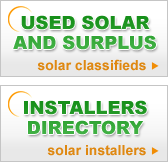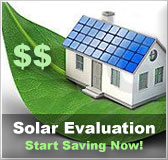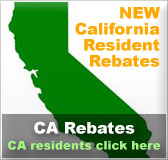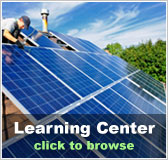
|
Colorado residential solar energy incentivesSales and use tax exemption for renewable energy equipment. The state of Colorado exempts 100% of all renewable energy equipment form sales and use tax. Qualifying renewable energy equipment includes; solar water heat, solar space heat, solar thermal electric, solar thermal process heat, PV and wind systems, biomass and geothermal electric. Solar sales and use tax rebate (Boulder) This is a sales tax refund issued to solar systems owners drawn from the tax revenues collected from solar energy sales. 35% of the unrestricted revenues will be refunded. Restricted revenues will not be refunded. 15% of the installation of the solar system will be refunded. Solar power pioneer loan program (Aspen) This program allows for 0% financing on loans for photovoltaics and solar water heat systems. Loans are typically offered for a payback period of 5 years. Loan amounts vary according to the size of the system. Participants must be full-time residents of Roaring Fork Valley to qualify. Solar pioneer rebate program (Aspen) This is a local rebate program offered to residents of the Roaring Fork Valley who install photovoltaic or solar hot water systems. Qualified installers must fill out a rebate application after the installation and must be COSEIA certified. Rebates are as follows: $2 per watt AC with a maximum limit of $6,000 for PV systems. $66.54 x annual energy savings with a maximum limit of $1,000 - $2,000 (depending on system size) for solar water heat systems. Clean energy finance districts This incentive is a property tax financing authorization which allows homeowners to pay for renewable and energy efficiency improvements by attaining a loan from their local government and repay the loan by voluntarily increasing their property tax assessment. These revenue sources include; bonds, independent lending institutions, contracts, gifts, grants, donations revenues from public utilities, etc. Financing may not exceed $12,500 per resident. Climate smart loan program (Boulder County) This loan program provides financing options for residents of Boulder County who want to make energy efficiency improvements and use renewable energy in their homes. Eligible energy technologies for this program include; solar water heat, PV systems, wind, biomass, solar pool heating, geothermal heat pumps and wood stoves. Loan amounts vary from $3,000 up to 50,000 and are repaid over 15 years. Repayment of the loan is paid as a special assessment on the borrower’s property tax bills. Applicants must pay a non-refundable $75 application fee. Local PV and solar water heat rebate programs The Governor’s Energy Office of Colorado has many solar rebate programs offered as grants throughout the state of Colorado which are provided to residents living in areas outside the service territory of Xcel and Black Hills Energy utility companies. These rebates match those offered to the customers of Xcel and Black Hills Energy. Grants are given to residents who purchase and install solar water heat and/or photovoltaics on their property. Rebate amounts vary but have a maximum incentive of $9,000 for residential PV systems and a maximum incentive of $3,000 for a residential solar water heat system. Detailed information on these programs provided by municipal utility program partners can be found online. Utility-sponsored loan and solar rebate programs Many utility loan and rebate programs are available throughout the state of Colorado, provided by municipal cities and utility companies. Information and details on all the different programs are available on the internet. Details and requirements for each program will vary. Loan and rebate programs are generally available for customers who install renewable energy systems and energy efficient equipment and appliances. Loans are usually 0% interest or low interest loans to help with the purchase and installation of solar and other energy efficiency technologies. Rebate amounts for solar and wind systems are typically determined by a per-watt AC basis and depending on the system’s size and applicable sector. Residential Renewable Energy Tax Credit This personal tax credit allows the taxpayer to claim a credit of 30% of expenditures including labor costs and installation of qualified residential solar-electric systems, solar water heating systems or fuel cells. Small wind-energy systems and geothermal heat pumps can also be accredited for. Solar-electric systems and solar water heaters have a maximum incentive of $2,000 if placed in service before 2009. There is no maximum incentive for systems placed after 2008. The excess amount of the federal tax credit may be carried forward to the next taxable year if it exceeds tax liability. This can be carried forward until 2016, but after that, it is unknown if the unused credit will be able to be forwarded. Residential Energy Conservation Subsidy Exclusion This is a personal exemption of 100% of energy conservation subsidies provided by public utilities. The value of a purchase or installation of any energy conservation measure by a customer such as solar water heat, solar space heat or photovoltaics will not be included in the customer’s gross income. Customers of an electric utility company, who participate in the utility’s energy conservation program, may receive a rate reduction of electricity furnished or a nonrefundable credit against the purchase price of the electricity on each monthly electric bill. Energy-Efficient Mortgages This is a federal loan program where homeowners can use EEM (energy-efficient mortgages) to finance renewable energy technologies in a home.  |







